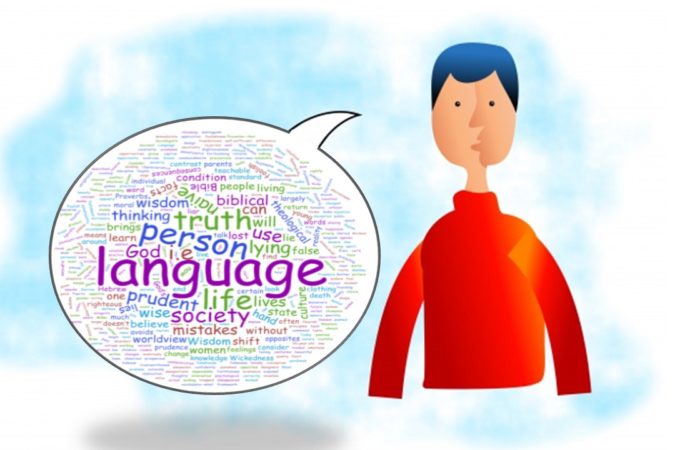Before you can change a society you must first change the language of the society. Western society has profoundly changed as a result of a shift from a biblical worldview to an atheist worldview. That worldview shift has been accompanied by a shift in language.
 A few years ago I was talking to a group of young women in Puerto Rico who were interested in fashion design. They had observed that clothing choices for women were limited by designers who often had an agenda. These young women were thinking about creating a line of clothing that would be beautiful and modest. They correctly pointed out that the word “modesty” has largely disappeared from our language. And, typically, when the term is lost, the concept is naturally lost as well.
A few years ago I was talking to a group of young women in Puerto Rico who were interested in fashion design. They had observed that clothing choices for women were limited by designers who often had an agenda. These young women were thinking about creating a line of clothing that would be beautiful and modest. They correctly pointed out that the word “modesty” has largely disappeared from our language. And, typically, when the term is lost, the concept is naturally lost as well.
The words we use shape our thoughts. Language is foundational to both personal and public life. The Bible speaks to us in language, using words. Our thinking about God’s truth and God’s existence needs to be shaped by the Bible. If the prevailing culture determines our language and our thinking we are without roots.
Consider some further examples of changes in language. Rather than abiding by the clear designations of man and woman, we talk about gender neutrality. We no longer talk about (or believe in) sin; now we simply make mistakes. Postmodern thinking has rejected absolute truth; now we believe truth to be a matter of individual taste. We have traded sanctity of life for quality of life. A baby is a product of conception.
At America’s founding our language was theological in nature. As we denied God we moved from theological language to man-centered, psychological language. Even Dr. James Dobson, a wonderful champion of biblical virtues, is trapped in the language of the culture. We cannot solve this problem without a return to theological language. The West has pushed God to the margins; until we return God to the center of life, we cannot hope to succeed.
When we consider the language of Proverbs—that is, the actual vocabulary—what do we find? How do the writers use language to speak into our lives? The wisdom literature often makes use of word pairs, opposites that show contrast:
- wise vs. foolish,
- righteous vs. wicked,
- prudent vs. naïve,
- truthful vs. lying.
Let’s look further at some of the biblical language about wisdom that has largely been lost in our society.
Wise vs. Foolish
A wise person is described in the Bible as a person who has knowledge, who discerns and judges rightly. A wise person can distinguish between truth and a lie. She can discriminate between what is righteous and what is unrighteous. Not only does she know the difference, she is capable of choosing what is good.
The foolish person, in contrast, lacks knowledge. She can only see what is immediately in front of her. She cannot think of what is eternal and invisible. She is rebellious, willing to disobey the law.
The wise receive wisdom when they obey God. Don’t miss the implication: they are teachable! Others may be exposed to the same opportunities to learn, but lacking a teachable spirit, they let the opportunity pass without availing themselves of wisdom.
The fool, on the other hand, doesn’t want to listen. He doesn’t learn from his mistakes. He is self-sufficient and constantly initiates conflict. He brings much pain to his parents. He is a cheater who is always guided by emotions.
Wisdom lives within the framework of life – truth, goodness and beauty; foolishness seeks to live against life, in lies, injustice, and the hideous.
Wisdom is the moral application of truth, living in the face of reality; folly is the choice to live in a world of illusion.
Righteous vs. Wicked
Righteousness brings nourishment to one’s own life and to those around him. Wickedness tears others down. One is stable, one unstable.
Wickedness describes a perverted person who is violating biblical principles. Justice, on the other hand, fulfills the divine commandments in a practical way.
We need to look for these characteristics in the people around us, the people in our daily lives, and those in government positions.
Prudent vs. Naïve
We rarely hear the terms “prudence” or “naïveté” in today’s culture. But Proverbs has much to say about these opposites. A prudent person thinks before he acts. He looks to the future to consider the consequences of his actions. A prudent person bridles his appetite. He takes precautions to avoid evil. He tries to act on the facts and avoids acting on his feelings. Unlike the naïve (or simple), the prudent learns from his mistakes. Webster’s 1828 dictionary defines prudence as “Wisdom applied to practice. Prudence implies caution in deliberating and consulting on the most suitable means to accomplish valuable purposes.”
 The naïve, on the other hand, fail to use discernment. They believe whatever they’re told rather than working to find the facts. A naïve person walks blindly, going toward his pleasures. As opposed to the prudent, the naïve allow their feelings to rule over the facts. They are slow to learn from their mistakes. As an ancient sage put it, they are like the dog that returns to his vomit.
The naïve, on the other hand, fail to use discernment. They believe whatever they’re told rather than working to find the facts. A naïve person walks blindly, going toward his pleasures. As opposed to the prudent, the naïve allow their feelings to rule over the facts. They are slow to learn from their mistakes. As an ancient sage put it, they are like the dog that returns to his vomit.
A society of people who are captive to their appetites will end in ruin if they do not begin to exercise discipline. Today we have 30-year-old children still living with their parents and playing video games.
We see prudence vs. naïveté illustrated so clearly today in the discussion over “transgender.” It is prudent to understand that biology (am I female or male?) is defined by reality. It is foolish to say that biology does not matter. It is naïve to build my life around a transgender illusion: “I feel like a female so I will live like a female.”
The headlines scream UK’s first pregnant man undergoing gender realignment treatment. This is foolishness. There is no pregnant man. There is a 20-year-old woman who self identifies as a man named Hayden Cross. This biological woman is four months pregnant. The British paper goes along with the illusion by declaring that a man is pregnant. Does the declaration make it so? Only in a society where narrative trumps truth. A more profound breakdown of language is hard to imagine.
Truthful vs. Lying
Truthfulness, in the Hebrew language of the Old Testament, is, “faithfulness, reliability, trustworthiness, i.e., a state or condition of being dependable and loyal to a person or standard; true, certain, sure, i.e., that which conforms to reality, and is so certain not to be false; honesty, integrity, i.e., being in a state or condition of telling the truth and living according to a moral standard.”
The opposite, lying, in Hebrew means “deception, misleading falseness, i.e., a state or condition which is utterly false and causes a mistaken belief; lie, i.e., a verbal communication which is false; liar, i.e., one who utters falsehoods and lies.”
Why does Proverbs commend truthfulness? Why does it warn us away from lying? Because while God wants us to flourish, the liar will languish. He will be broken and punished; he will endure severe consequences. The end of the lie is death.
The one that avoids lies and exercises the truth lives confidently and enjoys happiness. His is an abundant, prosperous life. He hates lying. He knows that lying brings death and poverty. What begins at the individual level eventually manifests itself in every sphere of our society.
- Darrow Miller
from a forthcoming book






